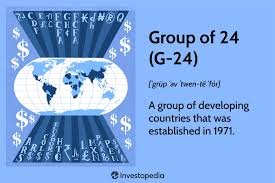Nigeria has assumed the helm of the Intergovernmental Group of Twenty-Four (G-24) countries.
In light of this new position, the federal government has vowed to amplify the voices of developing nations and promote inclusive global economic reforms when it officially assumes leadership on November 1, 2025.
This information was shared through a series of posts by the Central Bank of Nigeria (CBN) on its official X account on Wednesday.
Established in 1971, the G-24 unites developing countries to create unified stances on global monetary policy and development financing, ensuring their collective interests are represented in international economic discussions.
Read also:
Algeria president sacks central bank governor
Australian central bank warns of higher inflation
Cardoso reaffirms commitment to macroeconomic stability, stronger banking sector
Governor of the Central Bank, Olayemi Cardoso, on behalf of Finance Minister and Coordinating Minister of the Economy, Wale Edun, reaffirmed Nigeria’s dedication to enhancing the G-24’s influence as a platform for inclusive dialogue and reform.
Cardoso remarked that “we will concentrate on maintaining momentum in areas that are most significant to our members.
“We are eager to collaborate with members to further our shared goals of inclusive growth, equity, and global stability.
“We are committed to ensuring that the G-24 remains a powerful platform for advocating the common interests of emerging and developing economies.”
In 2024, the federal government urged for increased investments and trade partnerships among G-24 member nations.
Edun emphasized Nigeria’s substantial potential to attract foreign investment in key sectors such as manufacturing, agriculture, and oil and gas.
He also noted that Nigeria has one of the largest areas of arable land globally, second only to Brazil, highlighting the country’s potential to transition from a food importer to a leading global food exporter.






